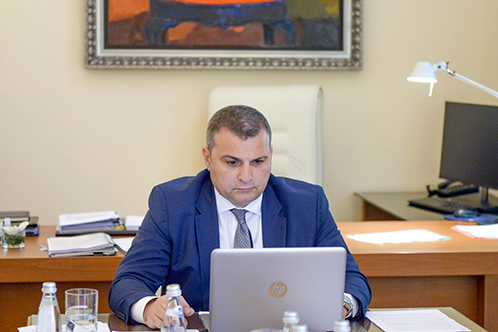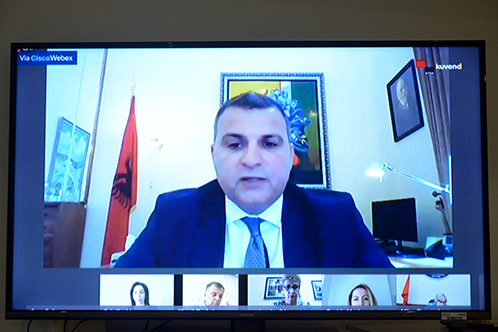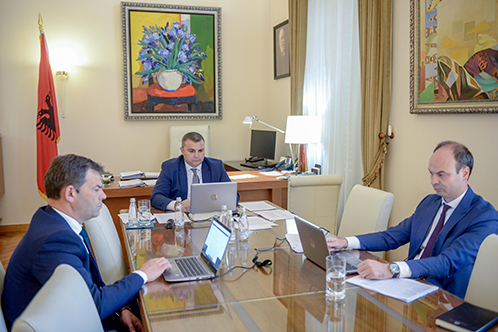BANK OF ALBANIA
PRESS RELEASE
Governor Sejko presents BoA’s Annual Report 2019 to the Parliamentary Committee on Economy and Finance
Publication date: 01.06.2020
On 1 June 2020, the Governor of the Bank of Albania, Mr Gent Sejko, through an on-line communication, presented the Annual Report of the Bank of Albania for 2019 to the Parliamentary Committee on Economy and Finance.

Reporting to the Parliament is a legal obligation through which is fulfilled the institution's accountability and transparency process on its work and results during the year, and informs lawmakers on the main objectives that institution aims to achieve in order to guarantee Albania’s monetary and financial stability in the period ahead. Initially, Governor Sejko explained that due to the shock created in the economy by the COVID-19 pandemic, the Bank of Albania’s forecasts on the future economic performance of the country have changed since the time of the preparation of the Annual Report.

Focusing on Albania’s economic performance in 2019, the Governor highlighted that the year left behind has been a challenging period for the Albanian economy, with an economic growth of 2.2%, which reflects the negative impact of the earthquake of 26 November on the economy.
Mr Sejko stated that, through the implementation of an accommodative monetary policy stance, the Bank of Albania has played a significant role for the improvement of the economic and financial environment in Albania. This easing stance was dictated by the undershooting inflation values. The aim was to keep funding costs low and to create the premises for a more stable exchange rate performance in order to support economic growth, employment and wages, thus helping the economy to return to equilibrium and inflation to target. At the same time, this policy affected the decrease of credit price and the growth of lending in lek (lending in lek to total lending ratio reached 48.7%, from 44.7% in 2017).

Also, the Governor focused on the work performed by the Bank of Albania in 2019 towards maintaining financial stability by strengthening the stability of the banking sector and the efficient and secure functioning of payment systems. The consolidation process of the banking sector was realised successfully during 2019. Currently, in the Albanian banking system operate 12 banks, from 16 banks in 2018. The non-performing loans indicator has dropped significantly: from 25% in 2014 to 8.4% at the end of 2019.
Another relevant aspect of the contribution of the Bank of Albania during 2019 was the improvement of the regulatory framework related with the operation of the two payment systems: AECH (Albanian Electronic Clearing House) for small-value payments; and AIPS –(Albanian Interbank Payment system) for large-value payments. Also, the draft-law “On payment services” was adopted in 30 April 2019. The implementation of this Law will affect the decrease of payment services costs and the promotion of the use of electronic payment instruments.

The Bank of Albania, as the sole issuer of the Albanian banknotes and coins, in September 2019, launched the new series of banknotes and put into circulation its first two denominations: 200 and 500 Lekë, respectively, whereas within 2020 it expects to put into circulation the denominations: 1000 and 10000 Lekë. Mr Sejko emphasised that the Bank of Albania has dedicated particular attention to the implementation of the recommendations of the Parliament’s Resolution, where one of the objectives of the educational campaign was to raise the awareness of the public not to use the terminology “old lek – new lek”.
Also, during 2019, the Bank of Albania has paid special attention to the improvement of internal governance, which enabled the management and continuity of the activity of the institution during the pandemic.
In conclusion of the presentation of the activity of the banking sector for 2019, the Governor underlined that the main financial indicators show that the banking system is well capitalised, with adequate liquidity and able to cope with any situation.
In his speech, Governor Sejko drew the attention on the new reality created by the global pandemic of COVID-19. The protective measures taken in containing the spread of the virus drove to the drop of consumption, investments and exports of goods and services. It is expected a decline of employment and an increase of unemployment, which will cause the decline of households’ income and a deterioration of enterprises’ financial situation, and that may also bring about an increase of the level of non-performing loans in the banking sector.
Governor Sejko emphasised that in order to cope with this situation, the Bank of Albania undertook timely measures to minimize the costs of the COVID-19 pandemic on the economy. In this context, the Bank of Albania cut its policy rate by 0.5%, removed quantitative thresholds in order to guarantee the supply of the banking system and of the economy with all the required cash liquidity, and eliminated the operational costs of electronic payment systems as well.
Meanwhile, a particularly important action that the Governor singled out was the extension with two quarters of loan instalment payments for enterprises and households in financial difficulties, but not only them, in order to ensure the solution of costumers’ requests and at the same time ensure the soundness of banks and of the system as a whole.
In this respect, Governor Sejko said that this new economic reality created by the COVID-19 global pandemic requires the cooperation of all market’s actors. In this regard, fiscal policy has a primary role in dealing with the situation, and it should guarantee the necessary funds for the healthcare system and enable financial assistance to the affected employees. These measures will affect the increase of the level of public debt, which is an acceptable cost in facing this new reality. The Bank of Albania, on its part, will continue to pursue an accommodative monetary policy stance, but without decreasing its vigilance on maintaining the financial soundness of the banking sector. The private sector will also play an important role, and should be more realistic in its plans, but also more careful with liquidity management. Governor Sejko underlined that, despite this situation, the Albanian economy will face successfully this challenge.
At the end of the session, the Governor responded to the questions addressed by the members of the Parliamentary Committee on Economy and Finance.

 Twitter
Twitter
 Youtube
Youtube
 Facebook
Facebook
 Flickr
Flickr
 RSS
RSS
 Subscribe
Subscribe
 Feedback
Feedback